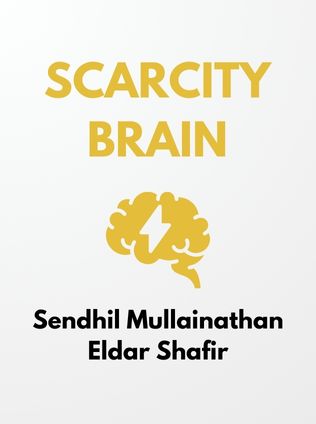
Scarcity
Fix Your Craving Mindset and Rewire Your Habits to Thrive with Enough
By Sendhil Mullainathan and Eldar Shafir
Published 09/2023
About the Author
Sendhil Mullainathan and Eldar Shafir are highly respected figures in the fields of behavioral economics and psychology, known for their innovative research that intersects human behavior, economics, and social policy. Sendhil Mullainathan is a Professor of Computation and Behavioral Science at the University of Chicago, where he has been recognized with the prestigious MacArthur “genius grant” for his groundbreaking work. His research spans a wide range of topics, from behavioral economics to social issues in the United States and beyond. Mullainathan is also the co-founder of ideas42, a nonprofit that applies behavioral science to address complex global challenges, including poverty, health, and education.
Eldar Shafir, on the other hand, is a Professor of Psychology and Public Affairs at Princeton University, where he focuses on decision-making processes in contexts of poverty and other forms of scarcity. He has been involved in numerous initiatives aimed at improving public policy through a better understanding of behavioral science, including his role as Vice-Chair of the World Economic Forum’s Global Agenda Council on Behavior. Together, Mullainathan and Shafir co-authored "Scarcity: Why Having Too Little Means So Much," a seminal work that explores how scarcity—whether of time, money, or resources—impacts human behavior and decision-making, often in ways that perpetuate the very conditions of scarcity.
Main Idea
"Scarcity: Why Having Too Little Means So Much" is a profound exploration of the psychological and behavioral effects of scarcity. The authors argue that scarcity, whether it pertains to money, time, or any other resource, creates a mindset that narrows focus, often leading to short-term thinking and poor decision-making. This "tunnel vision" can be beneficial in the short term, allowing individuals to manage immediate needs effectively. However, it also limits cognitive bandwidth, reducing an individual’s ability to plan for the future, make rational decisions, and manage other aspects of life. The book examines how these cognitive effects of scarcity can explain behaviors commonly observed in contexts of poverty and suggests that understanding these mechanisms can lead to better-designed policies that alleviate the burdens of scarcity.
Sign up for FREE and get access to 1,400+ books summaries.
You May Also Like
The Subtle Art of Not Giving a F*ck
A Counterintuitive Approach to Living a Good Life
By Mark MansonRich Dad Poor Dad
What the Rich Teach Their Kids About Money - That the Poor and Middle Class Do Not!
By Robert T. KiyosakiHow To Win Friends and Influence People
The All-Time Classic Manual Of People Skills
By Dale CarnegieFreakonomics
A Rogue Economist Explores the Hidden Side of Everything
By Steven D. Levitt and Stephen J. Dubner



















